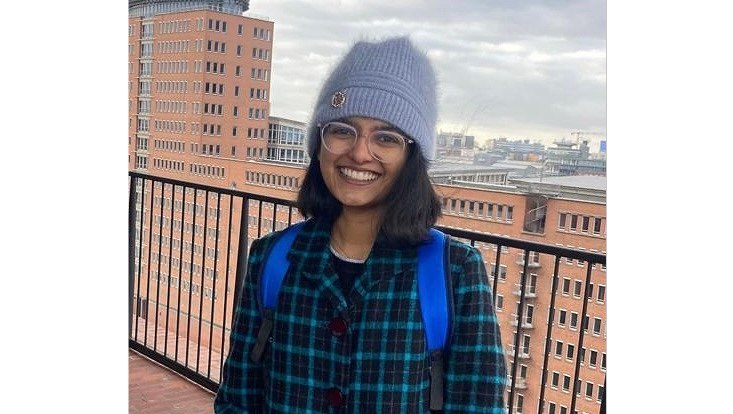Fiona Ann Jolly
21 March 2024

Photo: F. A. Jolly
Fiona Ann Jolly is from India and before coming to Hamburg for her Ph.D. she completed her Master's studies at the University of Bonn. Her thesis was based on an analysis of the ATLAS experiment at CERN with the topic “Constraints on the Higgs boson self-coupling, κλ and the di-vector boson di-Higgs boson coupling, κ2V via Higgs boson pair production with the ATLAS detector”.
What is the topic of your research?
I am part of the ATLAS group at DESY. My supervisor is Dr. Katharina Behr. So, for my Ph.D. project I continue to work in the ATLAS experiment, but have switched gears from Higgs boson to top quarks where my main topic of research is “Measurement of spin entanglement in top-quark pairs in the 1-lepton channel in ATLAS”. The top quark, a heavy elementary particle, is predominantly produced in pairs at the LHC. These tt‾ final states are crucial for probing rare Standard Model processes, such as the entanglement of tt‾ spins. Detecting this would mark the first observation of quark system entanglement and a milestone at LHC energies. Top quarks decay, transferring their spin information to their decay products. Entanglement is thus measured using an angular variable between the top quark decay products. While entanglement has already been observed in one decay channel (called the dilepton channel), I focus on exploring this phenomenon in the 1-lepton channel with ATLAS data. I am currently conducting sensitivity and background studies for precise measurements in this channel.
What fascinates you about your research focus?
I am fascinated by the utilisation of various machine learning tools and software applications in particle physics, making it not only a platform to advance our understanding of physics but also to cultivate essential interdisciplinary skills. Furthermore, being surrounded by wonderful colleagues well-versed in different areas of physics adds to the enriching experience.
What do you like about the cluster Quantum Universe?
What I like the most about the cluster is the networking part of it, allowing me to interact with individuals engaged in various experiments and fields that I was previously not aware of. Connecting with people from different parts of the world has consistently been a highlight of the Quantum Universe cluster events for me. The talks especially at the ‘What is … ?’ sessions during the QU days are the ones that I really enjoy.
